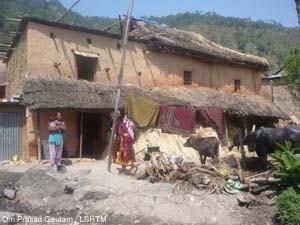Om's Food Hygiene Intervention - October 2012

This blog is the first in a series which will track SHARE PhD student Om Prasad Gautam's progress during his study into a food hygiene intervention to improve food hygiene behaviours, reduce food contamination and diarrhoeal diseases burden in Nepal.
Why food hygiene?
I have long been interested in food hygiene as an aspect of public health. Preventable and treatable food-borne diseases are a major cause of illness globally and inadequate food hygiene is likely to cause a substantial proportion of foodborne infections including diarrhoea among infants and young children. Although our instincts tell us that proper food hygiene practices may prevent disease, there is little rigorous evidence to support this premise from developing countries. Very few intervention studies have been carried out and there has been little effort to undertake food hygiene interventions for the reduction of childhood diarrhoea and malnutrition. A simple and replicable food hygiene intervention, which can be implemented by the WASH, health and nutrition sectors at scale has yet to be designed and tested. My PhD research aims to fill this gap.
What will my research entail?
My research has two phases using two distinct research designs::
- Phase One was conducted in a rural hill setting in Nepal, April to June 2012. This formative research examined mothers’ food hygiene practices and their environmental and psychological determinants, the level of microbes in the child’s food, and critical and behavioral control points. I used my research findings to prioritise five key food hygiene behaviours for the design of an intervention in the next phase. I delivered the findings of my formative research in my upgrading seminar at LSHTM in September, which I am pleased to say went successfully.
- Phase Two a cluster randomized, Before-After study with Control (BAC), will be conducted in eight clusters (each with approx. 28 households). These clusters will be arranged into four ‘intervention clusters’, and fours ‘control clusters’. I will design, test and implement a food hygiene intervention targeting mothers that have young children (6 to 59 months), which will be based on the five priority food hygiene behaviours I determined in Phase One. The primary outcome of interest of this research is sustainable improvements in mother’s food hygiene practices as a result of intervention. The secondary outcome is the effect of the intervention on the levels of microbiological contamination in food and on diarrhoeal diseases.
How long will Phase Two take?
The design, testing, implementation and effect measurement of the intervention will take one year. During this year I will:
- Develop a prototype intervention and assess feasibility
- Do baseline measurement, cluster randomisation and recruitment
- Conduct an intervention field test and pre-intervention outcome measurement
- Implement the intervention
- Measure the effect of and compliance with the intervention
What's next?
I am excited to be returning to Nepal to continue my second phase of research. In the following editions of this blog, I will keep you up to date with the progress of my work.
